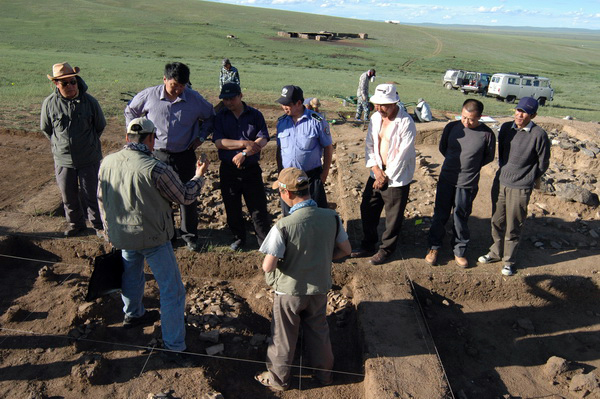President of Mongolian Academy of Sciences visits CASS

Chinese and Mongolian scholars collaborating on archaeological studies
sach.gov.cn
On Jun 26th, President of the Mongolian Academy of Sciences (MAS) Batbold Enkhtuvshin led a delegation to visit the Chinese Academy of Social Sciences (CASS). Zhao Shengxuan, CASS vice-president and vice secretary of the Party Group of CASS, met Enkhtuvshin and his delegation.
Zhao Shengxuan first extended his welcome to Enkhtuvshin and his delegation. He affirmed that since China and Mongolia established diplomatic relations, the two countries have consistently been good neighbors. In recent years especially, the two have strengthened bilateral cooperation and exchange, with China becoming Mongolia’s biggest trading partner and investor. Both countries share the same or similar views on many topics, Zhao continued, pointing to their close cooperation on many international issues.
In the face of complex and profound geopolitical changes and the continuation of the global economic crisis, Zhao called on China and Mongolia to further strengthen their communication, coordination and cooperation. These situations pose challenges to many countries he said, urging China and Mongolia to take their bilateral relations to the next level so as to address current and future challenges and crises and protect the interests of both countries.
Zhao further noted that China and Mongolia have carried out cultural exchange and cooperation on multiple levels and through a variety of channels. Cooperation in the social sciences is an especially important field of exchange, Zhao continued, noting that it will promote mutual understanding and trust between the two countries and further socioeconomic development within each country. MAS, Mongolia’s highest academic institution, already has history of academic exchange with CASS.
Zhao’s ideas resonated with Enkhtuvshin, who elaborated that bilateral cooperation between the two countries has been strong in recent years, especially in areas such as mineral extraction, geological exploration and economic development. Under these circumstances, the cooperation between MAS and CASS has special significance, he said.
Enkhtuvshin further pointed out that exchange between MAS and CASS has been at both the individual and institutional levels, with the two organizations exchanging research fellows and conducting joint projects. In particular, he expressed his appreciation for CASS’s strong efforts to facilitate cooperation and exchange between junior scholars at the two institutions.
On the same day, Hao Shiyuan, assistant to the president of CASS also met with Enkhtuvshin and his delegation. Hao gave a detailed history and overview of CASS, introducing its different institutions and research centers highlighting some of its notable academic achievements and their real world application and touching upon its relations with other research and higher education institutions.
Attendees to the meeting also included Li Xiangyang, director of CASS’s National Institute of International Strategy, Wang Lei, director-general of CASS’s Bureau of International Cooperation, Tsedenjav Sukhbaatar, the Mongolian ambassador to China, Erdenebaatar Dulguun, an advisor of the Mongolian Prime Minister, and Tudev Gan-Erdene, president of Mongolia’s National Committee of Science and Technology.
Deng Zhimei is a reporter from Chinese Social Sciences Today.
The Chinese version appeared in Chinese Social Sciences Today, No.467, and Chinese Academy of Social Sciences Newspaper, No.204, June 28th, 2013.
Translated by Jiang Hong

 PRINT
PRINT CLOSE
CLOSE